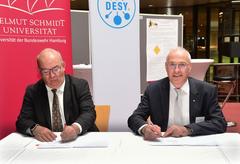Wim Leemans (DESY) Klaus Beckmann (HSU), Helmut Dosch and Beate Heinemann (both DESY, from left to right) at the Research Day at Helmut Schmidt University. Photo: HSU/UniBw H
DESY and Helmut Schmidt University - University of the Federal Armed Forces Hamburg (HSU/UniBw H) want to expand their strategic and operational cooperation. This was agreed by DESY CEO Helmut Dosch and the President of HSU/UniBw H, Klaus Beckmann, in a cooperation agreement, which they signed on March 26, 2024 as part of the Research Day at HSU/Uni Bw H.
Helmut Dosch explained at the signing ceremony: "In this cooperation, DESY and HSU/UniBw H are bringing together their complementary expertise in order to conduct joint research at the highest scientific level and develop innovative solutions in pioneering areas and socially highly relevant fields of application."
DESY and HSU are already working together successfully in several areas. For example, there are joint doctoral projects as part of the DASHH graduate school and collaborations in laser research and research into quantum materials.
"On the annual Research Day at HSU/UniBw H, scientists give an overview of their current projects and focal points. A novelty this year: we are opening up the Research Day to the outside world," explains President Klaus Beckmann. In order to fill the cooperation via the Hamburg science platform PIER+ with life, researchers from DESY were also present in addition to the Board of Directors to present posters together with the researchers from HSU/UniBw H in a satellite workshop and to exchange information about each other's projects."
DESY scientists were represented with more than 10 poster contributions. In addition to presenting existing collaborations, the satellite workshop focused on potential collaborations in the fields of materials science, laser research, elementary particle physics, scientific computing including data science, AI and HPC, quantum computing as well as control engineering and power electronics.









